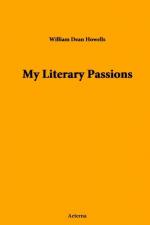There ought certainly to be some bound beyond which the cult of favorite authors should not be suffered to go. I should keep well within the limit of that early excess now, and should not liken the creation of Shakespeare to the creation of any heavenly body bigger, say, than one of the nameless asteroids that revolve between Mars and Jupiter. Even this I do not feel to be a true means of comparison, and I think that in the case of all great men we like to let our wonder mount and mount, till it leaves the truth behind, and honesty is pretty much cast out as ballast. A wise criticism will no more magnify Shakespeare because he is already great than it will magnify any less man. But we are loaded down with the responsibility of finding him all we have been told he is, and we must do this or suspect ourselves of a want of taste, a want of sensibility. At the same time, we may really be honester than those who have led us to expect this or that of him, and more truly his friends. I wish the time might come when we could read Shakespeare, and Dante, and Homer, as sincerely and as fairly as we read any new book by the least known of our contemporaries. The course of criticism is towards this, but when I began to read Shakespeare I should not have ventured to think that he was not at every moment great. I should no more have thought of questioning the poetry of any passage in him than of questioning the proofs of holy writ. All the same, I knew very well that much which I read was really poor stuff, and the persons and positions were often preposterous. It is a great pity that the ardent youth should not be permitted and even encouraged to say this to himself, instead of falling slavishly before a great author and accepting him at all points as infallible. Shakespeare is fine enough and great enough when all the possible detractions are made, and I have no fear of saying now that he would be finer and greater for the loss of half his work, though if I had heard any one say such a thing then I should have held him as little better than one of the wicked.
Upon the whole it was well that I had not found my way to Shakespeare earlier, though it is rather strange that I had not. I knew him on the stage in most of the plays that used to be given. I had shared the conscience of Macbeth, the passion of Othello, the doubt of Hamlet; many times, in my natural affinity for villains, I had mocked and suffered with Richard III.
Probably no dramatist ever needed the stage less, and none ever brought more to it. There have been few joys for me in life comparable to that of seeing the curtain rise on “Hamlet,” and hearing the guards begin to talk about the ghost; and yet how fully this joy imparts itself without any material embodiment! It is the same in the whole range of his plays: they fill the scene, but if there is no scene they fill the soul. They are neither worse nor better because of the theatre. They are so great that it cannot hamper them; they




